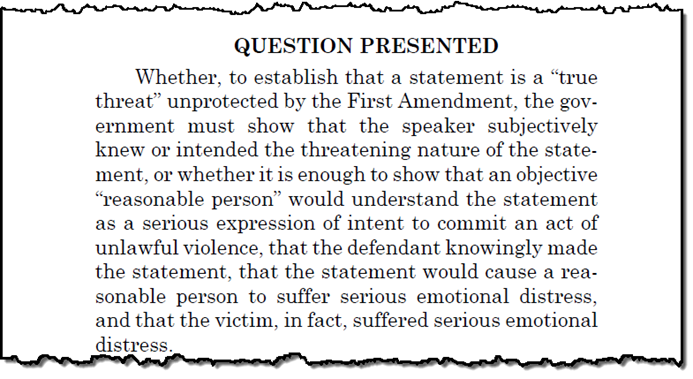

By Stephen James and Fred Johnson
The United States Supreme Court on Tuesday decided a closely watched case about what type of social media communications constitute a serious threat. The 7-2 decision was authored by Associate Justice Elena Kagan, with Associate Justices Clarence Thomas and Amy Coney Barrett disagreeing with the outcome and filing dissenting opinions.
In essence, the decision expanded the 1st Amendment protected right to free speech, and limited the types of speech that constitute a “true threat of violence,” subject to criminal prosecution. The ruling in Counterman v. Colorado reversed the Colorado criminal conviction of Billy Raymond Counterman.
Amy Howe at SCOTUSblog detailed the origin of the case:
“The events leading to Thursday’s ruling began nearly a decade ago, when Counterman sent a Facebook friend request to Whalen, a singer-songwriter then based in Denver whose career was on the rise. Over the next few years,  Counterman sent messages to Whalen that she described as ‘weird’ and ‘creepy,’ and although she attempted to stop the messages by blocking him on Facebook, Counterman would simply create new accounts.”
Counterman sent messages to Whalen that she described as ‘weird’ and ‘creepy,’ and although she attempted to stop the messages by blocking him on Facebook, Counterman would simply create new accounts.”
The case generated interest from a number of organizations who filed friend of the court (amicus) briefs, including the Cato Institute, the ACLU, Reporters Committee for Freedom of the Press and the San Francisco-based Electronic Frontier Foundation (EFF). Each argued that the conviction of Counterman be reversed.
EFF submitted a joint amicus brief with the Student Press Law Center (SPLC), arguing that social media communications should not be criminalized.
“[EFF and SPLC] believe that a sound understanding of the integral importance of social media in the daily lives of Americans, and the manner in which people across the country constantly interact through online networks, will confirm that speakers should not face prison time based solely on misjudgments about the scope of their audience or how a potentially unintended recipient would react to a message.”
The Reporters Committee for Freedom of the Press recognized that the case outcome could have an effect on reporters engaged in newsgathering, also taking the position that the state court criminal case be thrown out.
“Throughout this Court’s jurisprudence, strict “mens rea requirements” play an essential role in safeguarding that space—ensuring that journalists acting with a good-faith intent to inform the public need not fear that they “may accidentally incur liability” when covering challenging but important subjects…
The press must be able to pursue its work without concern that reporting intended to promote public deliberation will be misconstrued—or pretextually mischaracterized—as an effort to threaten or harass.”

The National Family Violence Law Center and the Domestic Violence Legal Empowerment and Appeals project jointly filed an amicus brief asserting that the Counterman criminal conviction be upheld.
“[A] ruling that the First Amendment requires proof of subjective intent in prosecutions for stalking or domestic abuse threats would jeopardize the protections afforded victims in the cases cited above, and in countless comparable situations. Judges will have more difficulty providing needed protective remedies in the face of these challenges if the standard is heightened—with real-world deleterious effects.”
Colorado Public Radio News reporter Allison Sherry provided comprehensive coverage of the case for those interested in the history and backstory of the nearly 10-year controversy.
Stephen James is an investigative reporter and Editor- at– Large on the Vanguard’s Tainted Trials, Tarnished Headlines, Stolen Justice series. Stephen is also co- producer of the 3 Flames Podcast. Season One: Midnight at the Bowling Alley will feature Stephen’s four years of letter exchanges with the Unabomber. Fred Johnson is a certified Jailhouse Journalist presently mentoring Lexi Logan and Lois Lane for the next generation working on the Maya and Sebastian Documentary with the WomenSV Court Watchers.
